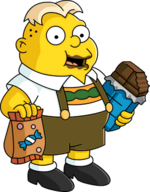|
|
| Line 1: |
Line 1: |
| | {{Italic title}} | | {{Italic title}} |
| | + | |
| | '''''Charlie and the Chocolate Factory''''' is a children's novel written by [[Roald Dahl]], originally published in 1964. It has been adapted into two feature films: a 1971 film titled ''{{W|Willy Wonka & the Chocolate Factory}}'', and ''{{W2|Charlie and the Chocolate Factory|film}}'' in [[2005]]. | | '''''Charlie and the Chocolate Factory''''' is a children's novel written by [[Roald Dahl]], originally published in 1964. It has been adapted into two feature films: a 1971 film titled ''{{W|Willy Wonka & the Chocolate Factory}}'', and ''{{W2|Charlie and the Chocolate Factory|film}}'' in [[2005]]. |
| | | | |
| Line 132: |
Line 133: |
| | {{TB|Composed the [[Theme Song|''Simpsons'' theme song]].}} | | {{TB|Composed the [[Theme Song|''Simpsons'' theme song]].}} |
| | }} | | }} |
| | + | |
| | == External links == | | == External links == |
| | *{{Wikipedialink|Charlie and the Chocolate Factory}} | | *{{Wikipedialink|Charlie and the Chocolate Factory}} |
| | | | |
| − | {{Cultural references}} | + | {{Cultural references|films=yes|books=yes}} |
| − | [[Category:Literary references]]
| |
| − | [[Category:Film references]]
| |
Latest revision as of 16:28, April 15, 2024
Charlie and the Chocolate Factory is a children's novel written by Roald Dahl, originally published in 1964. It has been adapted into two feature films: a 1971 film titled Willy Wonka & the Chocolate Factory, and Charlie and the Chocolate Factory in 2005.
The story centers on a young boy named Charlie Bucket, whose bad luck turns around when he finds a golden ticket inside a chocolate bar, winning him a tour of Wonka Chocolate Factory. On the tour with four other children, Charlie meets the eccentric owner Willy Wonka and the Oompa-Loompas who operate the factory. The other four children are ejected from the factory in unusual ways as a result of their selfish desires, leaving Charlie as the winner and heir of the factory.
The book and its film adaptations have been referenced numerous times on The Simpsons.
References to Charlie and the Chocolate Factory in The Simpsons[edit]
Characters[edit]
Episodes[edit]
| Picture
|
Season
|
Episode number
|
Episode name
|
Reference
|
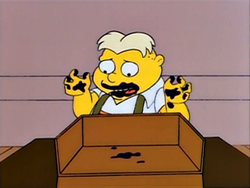
|
6
|
105
|
"Lisa's Rival"
|
Üter creates a diorama of Charlie and the Chocolate Factory for a school contest, but eats it before the judges have a chance to look at it.
|
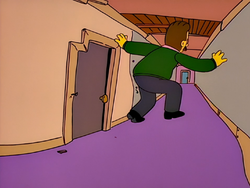
|
8
|
161
|
"Hurricane Neddy"
|
In the shoddily rebuilt Flanders house, a corridor becomes smaller before it leads to a tiny door. This is a reference to the scene in Willy Wonka & the Chocolate Factory, where Willy Wonka leads the tour through a hallway which reduces in size before it ends with a small door.
|
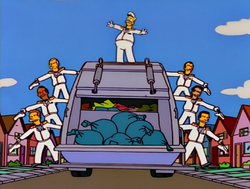
|
9
|
200
|
"Trash of the Titans"
|
Homer's song The Garbage Man is based on The Candy Man from Willy Wonka & the Chocolate Factory.
|
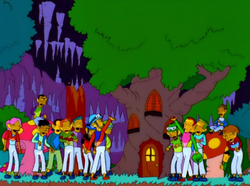
|
11
|
239
|
"Saddlesore Galactica"
|
The land of the Jockeys has a chocolate waterfall and river, which is mentioned in their song We Are the Jockeys.
|
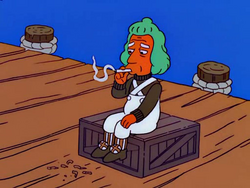
|
13
|
277
|
"Sweets and Sour Marge"
|
Marge tells Homer that she saw an Oompa-Loompa at Motherloving Sugar Corp., but it was in a cage and wasn't moving. Later on, Homer sees an Oompa-Loompa smoking.
|
|
|
15
|
327
|
"The Ziff Who Came to Dinner"
|
Lisa tells Artie Ziff that when Homer read Charlie and the Chocolate Factory to her, he thought the factory was real and has been searching for it ever since.
|
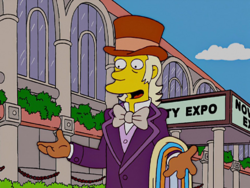
|
16
|
340
|
"Fat Man and Little Boy"
|
Goose Gladwell is based on Willy Wonka as he appears in Willy Wonka & the Chocolate Factory.
|
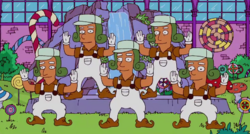
|
20
|
436
|
"Eeny Teeny Maya, Moe"
|
When Moe is at Maya's house, he sees a group of Oompa-Loompas on the television and quickly changes the channel.
|
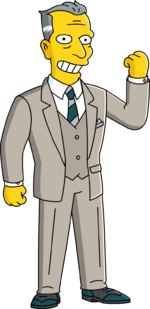
|
22
|
479
|
"The Scorpion's Tale"
|
Walther Hotenhoffer claims that his original name was Augustus Gloop and that he won a trip to a chocolate factory where he was sucked up a tube.
|
|
|
26
|
565
|
"Walking Big & Tall"
|
Homer lists the names that his friends mustn't call him. One of the names on the list is Augustus Gloop.
|
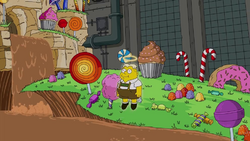
|
30
|
642
|
"My Way or the Highway to Heaven"
|
Üter imagines himself in the chocolate factory from Charlie and the Chocolate Factory where he drowns in the chocolate river, then goes to Heaven which also has a chocolate river.
|
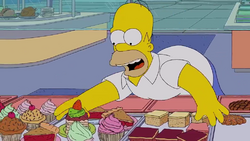
|
644
|
"Baby You Can't Drive My Car"
|
When Homer raids the cafeteria, an instrumental version of the song Pure Imagination from Willy Wonka & the Chocolate Factory plays in the background.
|
|
|
652
|
"I'm Dancing as Fat as I Can"
|
One of Krusty's writers suggests holding a golden ticket contest, referencing Charlie and the Chocolate Factory.
|
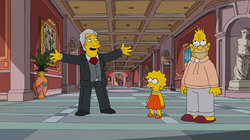
|
33
|
727
|
"Meat Is Murder"
|
The song "Shameless Ostentation" is a parody of "Pure Imagination" from Willy Wonka & the Chocolate Factory.
|
|
| Picture
|
Comic issue
|
Story name
|
Reference
|
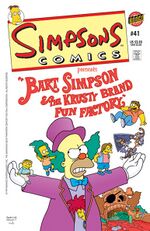
|
Simpsons Comics #41
|
n/a
(front cover)
|
The cover art is based on the theatrical release poster for Willy Wonka & the Chocolate Factory.
|
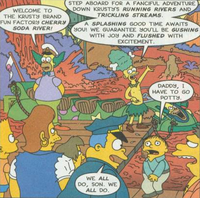
|
Bart Simpson and the Krusty Brand Fun Factory
|
The plot is based on Charlie and the Chocolate Factory.
|
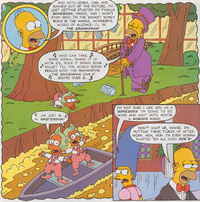
|
Simpsons Comics #53
|
The Beer Boys
|
Homer imagines himself dressed up as Willy Wonka performing a song named "The Brandyman", based on The Candy Man from Willy Wonka & the Chocolate Factory. There is also a river made of beer and Bart, Lisa and Maggie are dressed up as Oompa-Loompas.
|
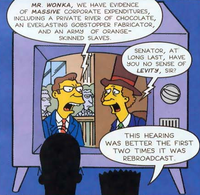
|
Simpsons Comics #85
|
The Simpson Family Circus
|
Bart and Homer watch a rebroadcast of a Senate hearing where Willy Wonka is being questioned about "massive corporate expenditures" involving his chocolate factory.
|
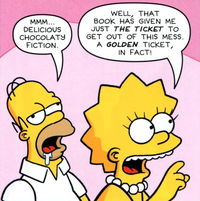
|
Simpsons Comics #216
|
Dolls Well That Ends Well
|
Using inspiration from Charlie and the Chocolate Factory, Lisa convinces Marge to hide a million dollars inside a My-Size Burnsie doll, so that people would destroy them all to find the one containing the money.
|
|
Common cast and crew[edit]
| Picture
|
Name
|
Role in Charlie and the Chocolate Factory
|
Role on The Simpsons
|
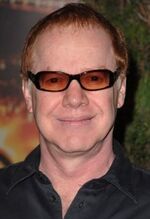
|
Danny Elfman
|
Composed the music for the 2005 film adaptation.
|
Composed the Simpsons theme song.
|
|
External links[edit]


